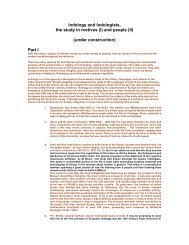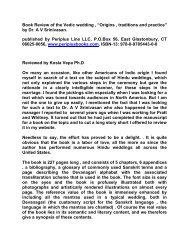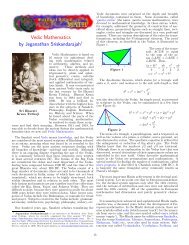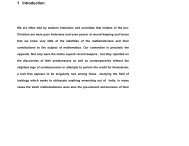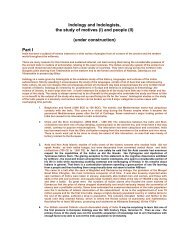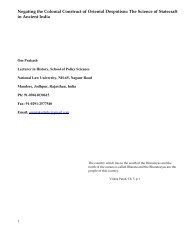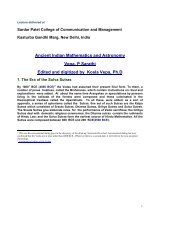The Dhaarmik Traditions - Indic Studies Foundation
The Dhaarmik Traditions - Indic Studies Foundation
The Dhaarmik Traditions - Indic Studies Foundation
You also want an ePaper? Increase the reach of your titles
YUMPU automatically turns print PDFs into web optimized ePapers that Google loves.
Other Quotations<br />
20. GeorgeJoseph Gheverghese c.v<br />
Finally, if we accept the principle that teaching should be tailored to children's<br />
experience of the social and physical environment in which they live, mathematics<br />
should also draw on these experiences, which would include in contemporary Britain<br />
the presence of different ethnic minorities with their own mathematical heritage.<br />
Drawing on the mathematical traditions of these groups, indicating that these cultures<br />
are recognized and valued, would also help to counter the entrenched historical<br />
devaluation of them. Again, by promoting such an approach, mathematics is brought<br />
into contact with a wide range of disciplines,including art and design, history and<br />
social studies, which it conventionally ignores. Such a holistic approach would serve<br />
to augment, rather than fragment, a child's understanding and imagination<br />
21. Max Müller dated the Rig Veda to 1200-1500 BCE, but he also said that these<br />
dates were provisional and that he has "repeatedly dwelt on the hypothethical<br />
character of the dates... All I have claimed for them has been that they are<br />
minimum dates." (Müller 1892). And he also asserted: " Whether the Vedic<br />
hymns were composed 1000, or 1500, or 2000, or 3000 years BC, no power on<br />
earth will ever determine." (Müller 1891:91). Max Müller's contemporary critics<br />
have pointed out that "the whole foundation of Müller's date rests on the<br />
authority of Somadeva.. [who] narrated his tales in the twelfth century after<br />
Christ [and] would not be a little surprised to learn that "a European point of<br />
view" raises a "ghost story" of his to the dignity of a historical document."<br />
(Goldstücker 1860; Bryant 2001).<br />
<strong>The</strong> common heritage of the Indo-European languages is one of the most powerful and<br />
unexpected discoveries of modern science and elicited incredulity which is still to be<br />
encountered today. Max Müller recounted that any remarks on Sanskrit were treated<br />
with contempt by his teachers and that "no one was for a time so completely laughed<br />
down as Professor Bopp, when he first published his Comparative Grammar of<br />
Sanskrit, Zend, Greek, Latin and Gothic. All hands were against him." (Müller 1883).<br />
93



